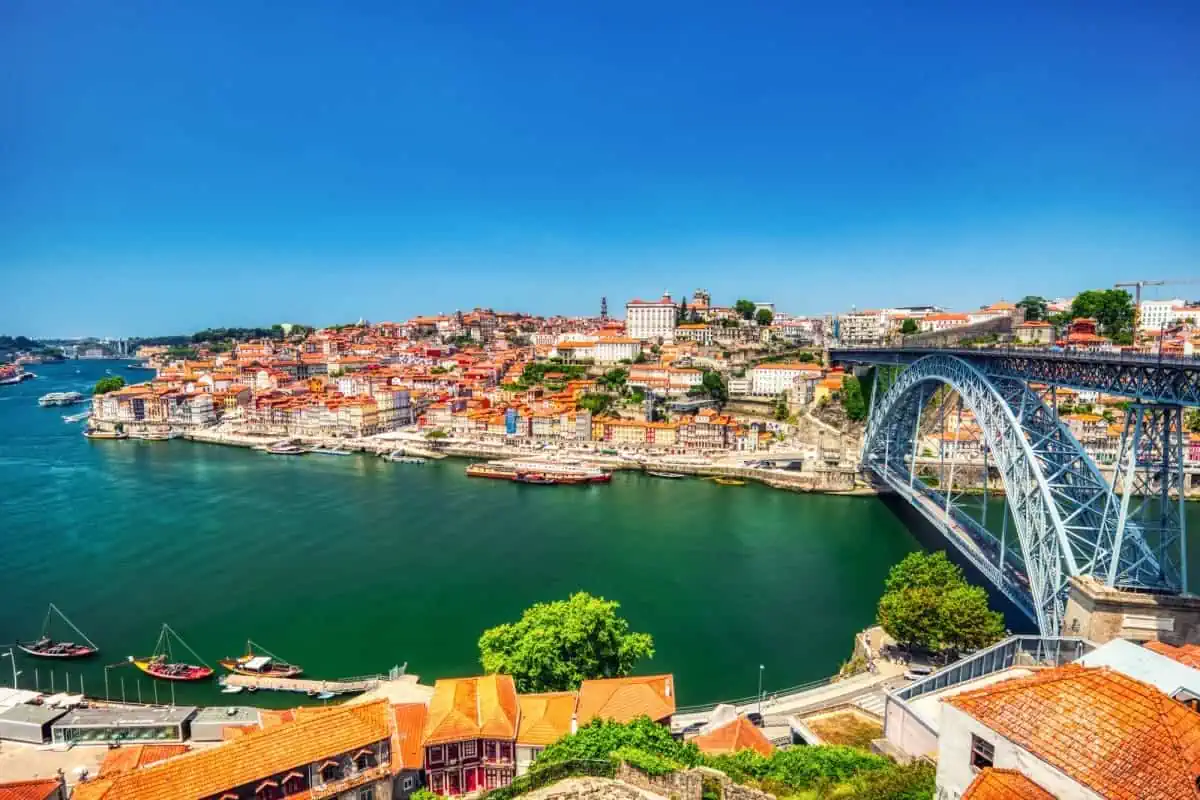From year-round nice weather and beautiful beaches to an affordable cost of living and fantastic health care, there are many benefits to living in Portugal, resulting in it becoming one of the most popular countries for expats and digital nomads.
However, beyond its idyllic Mediterranean climate and laid-back pace of life, living in Portugal does have its drawbacks that make living in the country better suited for some than for others.
As such, I have created this list weighing the pros and cons of living in Portugal to help you determine if moving to this sunny slice of paradise is the right move for you.
A Quick Overview And Comparison
| Pros of Living in Portugal | Cons of Living in Portugal |
| Mild Year-Round Climate | Largely Cash Based Economy |
| Beautiful Beaches | Very Bureaucratic |
| Affordable Cost of Living | Slow Pace of Living |
| English Is Widely Spoken | Crowded During Tourist Season |
| Friendly and Welcoming Locals | Unreliable Public transportation |
Living in Portugal Pros and Cons
1. Mild Mediterranean Climate
One of the biggest draws leading expats to move to Portugal is the country’s mild Mediterranean climate. The winter blues are just not existent in Portugal, which boasts an average of 300 days of sunshine every year.
Summers in Portugal are known to be hot and arid, with temperatures averaging around 27 degrees Celsius. Meanwhile, winters are a little chillier but rarely dip below 10 degrees, although the country’s southern regions and autonomous islands tend to have temperatures a few degrees warmer.
Overall, Portugal is a great destination to live in for those seeking a mild seasonal climate and nice sunny weather throughout the year.

2. Beautiful Coastal Beaches
As if Portugal’s pristine year-round weather wasn’t enough, the country makes it easy to enjoy the sun at some of the world’s most beautiful beaches.
Boasting 1,794 km of coastline, Portugal has over 352 breathtaking beaches, 82 of which are officially recognized as Blue Flag destinations thanks to their clean and clear waters.
And while the country’s mainland is home to several world-class coastal getaways, the best beaches in Portugal are found within the Azores. This autonomous island chain boasts a quieter way of life, perfect for those looking for a laid-back lifestyle.
3. Affordable Cost of Living
Hands down one of the biggest advantages of living in Portugal is the country’s affordable cost of living. In fact, Portugal isn’t only the most affordable country in Western Europe, but it is even comparable to the less expensive countries of Eastern Europe.
Portugal’s cost of living is 45.1% lower than the United States and 40% lower than the United Kingdom’s. This massive disparity in living expenses is not only one of the biggest enticements for moving to Portugal but also means you will save significant portions of your income for exploring your new home.
4. High Safety Levels and Low Crime Rates
Along with being an affordable destination to live in, Portugal is also extremely safe, with a global peace index of 1.301, making it the sixth safest country in the world.
Even compared to other Western European countries, the crime rate in Portugal is extremely low, promoting a safe and secure atmosphere for a carefree lifestyle.

5. Affordable Healthcare
Portugal spends about 10.6% of its GDP on providing free, high-quality healthcare. The best part is that this benefit isn’t just kept exclusive to the country’s citizens but is also offered to long-term residents of the country, promising further enticement to make a move to Portugal.
Portugal also offers private clinics to counteract the long wait times that can be associated with free public healthcare, although these services do come with additional expenses.
6. English is Widely Spoken
One of the biggest barriers to living in a new country is the inability to communicate with the locals. However, English is widely spoken as an unofficial second language in Portugal, which even has the eighth-highest proficiency levels among non-native English-speaking countries in the world.
Not only do many locals speak English, but the country is also home to a burgeoning expat community, promising a convenient outlet for communicating with your fellow foreigners.
7. Friendly and Welcoming Locals
Not only is the crime rate low in Portugal, but the locals are also extremely friendly and welcoming to outsiders. From sharing their local customs to inviting you to their dinner tables, the Portuguese people are among the most alluring draws to making the move to the country.
Additionally, while English is widely spoken, the local population is also very patient and encouraging towards expats practicing their local linguistics, and learning a couple of Portuguese phrases goes a long way in making a good impression.

8. Easy To Explore Other European Countries
If you are coming from a country not already on the European continent, one of the biggest advantages of moving to Portugal has to be the ability to easily and affordably venture out to explore other neighboring European destinations.
While Portugal provides a great spot to live and work, it is also conveniently a part of the Schengen Area, promising easy access and cheap transportation to many nearby travel hot spots.
9. Vibrant History and Culture
While Portugal serves as a great base for exploring the rest of Europe, there is also plenty to be seen and experienced within the country itself. From medieval castles to historic port towns, there is plenty to explore within the country, and there is always something new to see when living in Portugal.
Also worth mentioning is the Portuguese cuisines and wines. Using fresh local ingredients, living in Portugal is a mouthwatering indulgence and is worth moving to the country on its own.

The Cons Of Living In Portugal
10. Heated Housing Is Rare
While Portuguese winters are typically mild, they do get chilly, especially in the northern and high-altitude regions. What’s even worse is that central heating is not a common amenity in most homes. Instead, most residents are required to buy a heater to stay warm during the cold months.
On top of heating issues, houses in Portugal are noted for their lack of privacy. Thin walls are common in Portuguese architecture, which can become a serious drawback should you have noisy neighbors.
Both of these housing issues are something to consider before moving to the country.
11. The Ocean Is Very Cold
While the country is home to some of the world’s most beautiful beaches, it is worth noting that the waters around Portugal are typically very cold, ranging between 10 and 17 degrees Celsius throughout the year.
While this may not pose a serious concern for many expats moving to Portugal, it is something to consider if you prioritize water activities when choosing somewhere to live.

12. Paying by Card is Not Widely Accepted
Cash is king in Portugal, and most local establishments don’t even accept any form of debit or credit card. So if you are moving to the country, you should plan on having cash on you at all times.
If you are coming from a country where paying by card has become the standard, this change in economic habitat can become inconvenient and is worth considering before making the move.
13. Crowded During The Tourist Season
For all the reasons why Portugal is a great place to live, the country is also a popular destination amongst holidaymakers. As such, the country can become very busy during the peak season, and residents can expect to deal with crowds during these periods.
Portugal’s high season is during the Christmas holidays and summer, although the country does host tourists around the year. Lisbon, Porto, and Algarve are particularly popular destinations amongst tourists and should be avoided if you prefer living in quieter areas.
14. Local Bureaucracy Can Be Slow
The local bureaucracy is generally considered to be one of the biggest drawbacks of living in Portugal for both expats and nationals alike. The worst part about it is that the Portuguese bureaucracy tends to be very slow.
Things such as setting up utilities or applying for a driver’s license can take months to complete. However, things are even worse when you have to apply for a visa or residence permit.
While Portugal promises several ways to gain residency in the country, this does require extended time and planning to get approved for your move.

15. There is a Language Barrier
While English is widely spoken in Portugal, it is not considered an official second language. As such, Portuguese is the primary mode of communication and is primarily used in all official aspects.
While this generally doesn’t pose an issue amongst tourists, it can be a problem if you are planning on living in the country long term, as all official forms and government offices operate using the official native language.
Learning at least basic Portuguese is essential for living a comfortable lifestyle in the country and can be considered a drawback to living here.
16. Slower Pace of Living
The slow operations of local bureaucracy are very much a reflection of the Portuguese pace of living as a whole. Things are just slower here.
The people are laid back and operate at a much more relaxed speed. If you are coming from a country that prioritizes the business day, things such as service at a restaurant or other business may seem slow. But that’s just how people live here, and it’s something you will have to get used to if you are going to join the local communities.
Still, this slower pace of living isn’t for everybody and may be a reason not to move to the country.

17. Public Transportation is Unreliable
Portugal’s laid-back attitude extends to its transportation networks, which are often off-schedule or just generally ineffective. The country has worked towards improving its public transportation in recent years but still falls short when compared to other European countries.
Getting around via public transport is manageable in most major cities, but living outside of these major population areas may require a private vehicle to get around efficiently, which can become quite expensive given the country’s gas prices and insurance rates.
18. Driving Takes Some Getting Used To
A drawback that comes with needing your own vehicle to get around the country effectively is that Portuguese roads are not the easiest to drive on.
Major highways are well-maintained and generally safe to navigate. However, the country’s side roads are often narrow with many bends. On top of this, road safety is not the best, and Portugal has high rates of car accidents.
Driving in Portugal takes some getting used to and maybe a reason to avoid moving here if you are not a strong driver.





